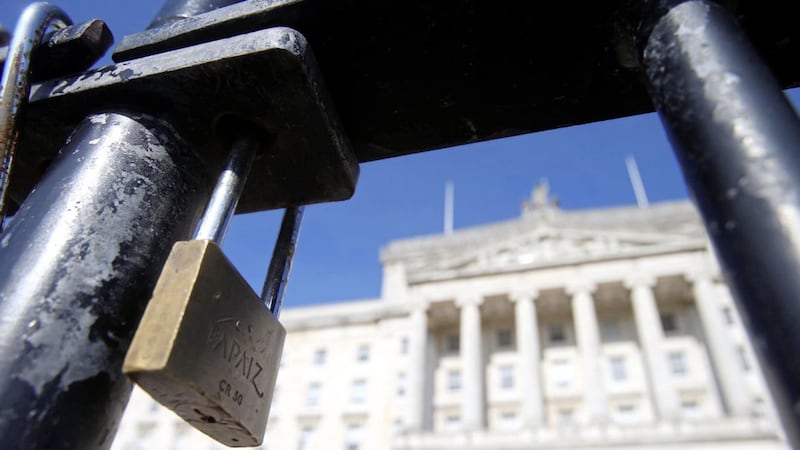Spain and Catalonia confront potential secession with pain, anger and division, a central government and rival in waiting testing national institutions to the limits.
The British state which claims this place, meanwhile, is consumed at its heart by infighting, while the official Ireland many here yearn towards is brusque, obliged by duty to look north.
The best that can be said about the prolonged pretence of Stormont talks, puffed into bogus positivity every few weeks but resolutely skirting the crunch issues, is that they provide space to think without sentiment. The players posture, with no progress.
Are friendships developing at the fruitless talks tables, out of shared frustration between people who at least have youth in common? Nobody admits to spotting even two minds meeting.
The highlight may have been at a Macmillan Cancer function when Arlene Foster asked the SDLP’s Claire Hanna could she give the new Hanna baby a cuddle.
It might well still happen - but resurrecting Stormont is implausible, the ‘project’ almost certainly doomed in the long run. There is not the least sign that unionists are any closer to taking responsibility for leaching the life out of power-sharing.
The now relegated, overwhelmed northern wing of Sinn Féin made the effort with Peter Robinson and then Foster, but lack the talent and policy input to manoeuvre around unionism.
Nor may they want to. Maybe the Greens' Steven Agnew has it right and making a Belfast legislature work is no longer in the party’s programme.
What has become of unionist attitudes in the meantime is lowering.
The untried Robin Swann inherited Mike Nesbitt’s half-thought-through and largely solo liberal run, and pretended it hadn’t happened. Nesbitt before his final stretch, authority bust, relations with the party dissolved, had nonetheless been quick off the mark in rubbishing the notion of institutionalised recognition for Irish.
The UUs would watch for signs, said he, that the DUP might concede an Irish act. Not allowable, incompatible with British Northern Ireland, also unnecessary, said Mike the moderate and impartial television news man.
With his gilded Campbell and Cambridge start in life Nesbitt had been hired to give the UUs a smoother image. Accustomed to media mingling, he enjoyed the liberal look. If even he failed to check his privilege before informing nationalists what they might have, what hope was there for Swann?
Tone-deaf as the DUP on how nationalists hear unionist prescriptions for their rightful expectations, Ulster Unionism has vanished from the mix that might create real power-sharing.
But then this is not a novel development. Back when the speciality of the Reverend Ian Paisley was inflaming crowds and encouraging their fears, ‘nice’ unionist supporters of the older party helped vote him into the European Parliament as the DUP’s ranting, anti-Popery champion.
Their excuse – for those who felt they needed one, and few if any seemed to - was that the SDLP’s John Hume might otherwise top the poll. Catholic Europe must understand that Northern Ireland was Protestant.
As the simple numerical majority that so many clung to has slipped below the horizon, taking with it the last distraction from political thinking, middle-class and upper middle-class voters look increasingly likely to have shifted their support to the DUP. Or like their parents they have opted out of politics.
Some attention lately has focused on the ‘transition’ of loyalist paramilitaries to civic life; halting, contradictory, festooned with criminality.
It is no slower a process than that of the unionist parties towards whole-hearted participation in a post-Troubles politics that includes the IRA’s peaceful creation, Sinn Féin. Nor, more shamefully, is it any less grudging a development than that of the Republic’s dominant parties.
Fine Gael and Fianna Fáil alike are still stiff with outrage that they have been required – by the voters, moreover – to share the Dáil with SFers. Worse, they must now begin to consider them as possible coalition partners.
But the subtext to Leo Varadkar’s snippiness at Mary-Lou McDonald is that Sinn Féin is still a threat to democracy.
The Republic’s political class sees no contradiction between their own distaste for the party of McDonald and Gerry Adams and attempts to persuade unionists back into Stormont.
Though the same voices at another moment can be loud in disgust at what the IRA, who steered SF into being, did to DUP families and other unionists.
Fit to share power in the black north but not the Dáil? From a legislature born out of bloodshed this is precious behaviour, and the weirdest of examples to give northern unionists.








